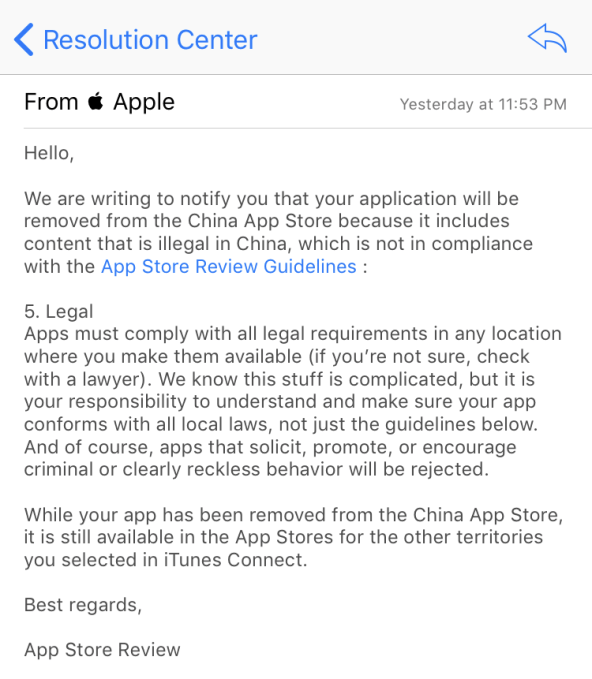Apple removes VPN apps from the App Store in China
The Chinese government’s crackdown on the internet continues with the news that Apple has removed all major VPN apps, which help internet users overcome the country’s censorship system, from the App Store in China.
The move was first noted by ExpressVPN, a provider based outside of China, which said in a blog post “all major VPN apps” including its own had been purged from Apple’s China-based store. The company shared a note from Apple (below) explaining that its app was removed because “it includes content that is illegal in China.”
The app continues to be available for users across the world outside of China, the company said. However, the process to create an App Store account in a different country is unknown to many users, so it is unlikely to fill the void of the missing Chinese app.
Another provide, Star VPN, tweeted that its app had also been removed.
Apple had not replied for comment at the time of writing.

ExpressVPN shared a note from Apple notifying it of the removal of its app in China
The App Store purge is hugely impactful because VPNs represent the only way that a China-based individual can bypass state censorship controls to access the internet without restrictions. The Chinese government effectively illegalized VPNs when new rules issued in January required them to receive government approval in order to operate. That appears to be why Apple was forced to remove ExpressVPN and others like it.
Apple may believe it is best for its business to co-operate with requests from Beijing, but this App Store purge just created one of the biggest setbacks for the free internet in China’s history.
“We’re disappointed in this development, as it represents the most drastic measure the Chinese government has taken to block the use of VPNs to date, and we are troubled to see Apple aiding China’s censorship efforts. ExpressVPN strongly condemns these measures, which threaten free speech and civil liberties,” ExpressVPN wrote on its blog.
Today’s news is the latest in a series of developments against the free internet from China.
Two popular VPN services were forced offline in China earlier this month leaving their users, which included professionals who require access to the global internet for work, without an alternative. Government officials denied a story from Bloomberg that the country’s mobile operators had been told to ban VPN apps by early 2018, but other steps have clearly been taken. Reuters reported earlier this month that the Great Firewall, the term for China’s internet censorship apparatus, had been “upgraded” with new capabilities. VPN services subsequently found that they had been hit by the most sophisticated attacks from China to date. High-end hotels have even ceased offer VPNs to guests.
Those new capability apparently also made it possible for the government to interfere with messaging apps. While now blocked entirely, WhatsApp users found that they were unable to send videos and photos through the chat app and issues seemed to extend to WeChat, China’s most popular messaging service. The censorship seemed to be linked to the response to the death of dissident Liu Xiaobo, a recipient of the Nobel Peace Prize, who lost a battle to liver cancer earlier this month having been denied permission to leave custody to seek medical treatment overseas.
Going direct to Apple is becoming an effective way to enforce censorship since the U.S. firm controls what apps are available in China. The tactic proved successful for China earlier this year when Apple removed the New York Times app from the local Chinese App Store. The Times and Wall Street Journal are among a number of international news sites blocked in China, according to censorship monitoring service Great Fire.
It’s unclear whether similar action has been taken with Android stores in China. The Google Play Store is not present in China, where a handful of third-party app stores are the most influential distributors of Android apps.
Not-for-profit group GreatFire offers ‘censorship-proof’ alternatives like its Android VPN FreeBrowser and other services that include a collaboration with The New York Times, but Apple’s iOS doesn’t permit similar options.
Apple just announced Isabel Ge Mahe as the first managing director for its Chinese business and, beyond battling a sales slump in China, the long-time Apple executive is tasked with the difficult job of managing a relationship with Beijing. The U.S. firm recently announced plans to develop its first China-based data center, a move that is thought to be related to the country’s new cybersecurity laws which went into effect June 1.




